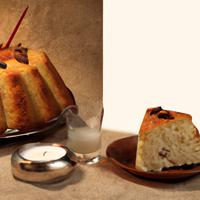
1 serving (100 grams) contains 250 calories, 5.0 grams of protein, 10.0 grams of fat, and 35.0 grams of carbohydrates.

Log this food in SnapCalorie

Nutrition Information
Calories |
601.0 | ||
|---|---|---|---|
% Daily Value* |
|||
| Total Fat | 24.0 g | 30% | |
| Saturated Fat | 12.0 g | 60% | |
| Polyunsaturated Fat | 0 g | ||
| Cholesterol | 120.2 mg | 40% | |
| Sodium | 360.6 mg | 15% | |
| Total Carbohydrates | 84.1 g | 30% | |
| Dietary Fiber | 2.4 g | 8% | |
| Sugars | 48.1 g | ||
| protein | 12.0 g | 24% | |
| Vitamin D | 24.0 mcg | 120% | |
| Calcium | 240.4 mg | 18% | |
| Iron | 2.4 mg | 13% | |
| Potassium | 360.6 mg | 7% | |
* Percent Daily Values are based on a 2,000 calorie diet. Your daily values may be higher or lower depending on your calorie needs.
Food Attributes
Source of Calories
About Yogurt cake
Yogurt cake is a moist, tender dessert originating from French cuisine, cherished for its simplicity and versatility. Made with basic ingredients such as plain yogurt, flour, sugar, eggs, oil, and baking powder, some versions incorporate zest or berries for added flavor. The use of yogurt lends the cake a slightly tangy profile, while contributing moisture and a creamy texture. Yogurt is a source of probiotics and calcium, giving this dessert a nutritional edge over heavier cakes. However, the sugar and oil content should be considered in moderation, as they add to the overall calorie and fat levels. Popular for its easy preparation, yogurt cake is often baked as a snack or light treat, ideal for pairing with coffee or tea. It's a widely loved recipe for those seeking a balance between indulgence and more health-conscious options.



